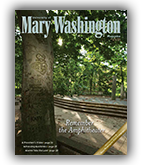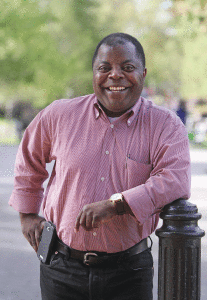Today Gerald Ndikintum, M.Ed. ’06 is an important figure in the Northern Virginia education community. But not too long ago – before he became an adjunct instructor in the UMW College of Education, before he was chair of the Fairfax County Public Schools Department of English for Speakers of Other Languages, and before he settled in the U.S. – Ndikintum was fighting for the rights of teachers and English speakers in Africa.
A native of Cameroon, Ndikintum developed a love of language early on. He spent 11 years teaching in secondary The Dangers and Powers of Speech schools throughout Cameroon while acting as a teacher representative for a budding trade union. An advocate for the weak, he battled injustices aimed at teachers, women, children, and English speakers. Over time, he found himself getting more politically engaged.
“It was particularly in my fight for teachers and English-speaking Cameroonians that I got very involved with the nascent multiparty politics in Cameroon,” said Ndikintum, 48.
In 1996, he ran for parliament on the opposition ticket and lost by fewer than 100 votes. He ended up losing more than the election. “In Cameroon, it wasn’t a welcome idea to run against the ruling political party if you were a civil servant, and as a secondary school teacher paid by the central government, I had done the unthinkable.”
Ndikintum continued the fight, but six years later he fled Cameroon in fear for his life. A Peace Corps worker who had lived with him and his family helped him leave.
Once in America, Ndikintum settled in Spotsylvania, Va., where he lives with his wife and five children. He got a full-time teaching job at Spotsylvania County Public Schools and started reading about teacher education programs in Northern Virginia and Richmond. “I liked what I found in UMW,” Ndikintum said. “There was this family feel in the ESL [English as a Second Language] department that made me want to be part of such a family.”
He was pleased with his UMW graduate classes because they focused on instructing ESL teacher candidates on how to work with students through classes such as sociolinguistics, second language acquisition techniques, and multi-/cross-cultural communication.
At UMW, the most important thing he learned was how to conduct scholarly education research. “I relished it,” he said, and it inspired him to pursue a doctorate.
Professor Jo Tyler and assistant professor Patricia Reynolds were influential during his studies at UMW, Ndikintum said. Reynolds’ cross-cultural education class “spoke to me like no other class had done.”
“I was able to understand a lot of things that happened around me. I was able to give a name to the things I did, but most importantly, I had a teacher who was corroborating my feeling that my status as an English learner wasn’t a deficiency but only a difference.
“I really felt empowered, and this increased my desire to empower others.”

